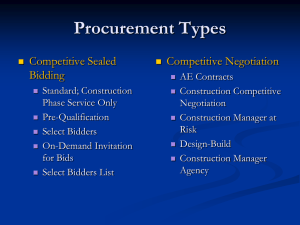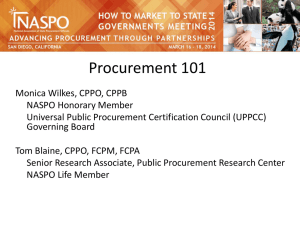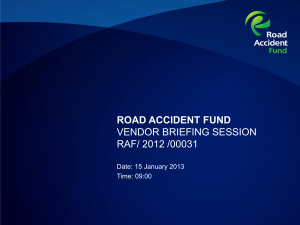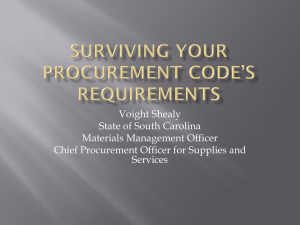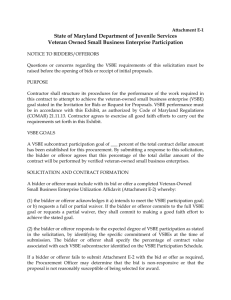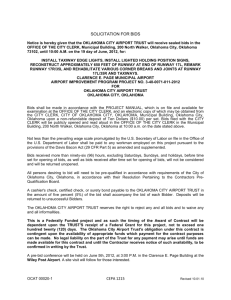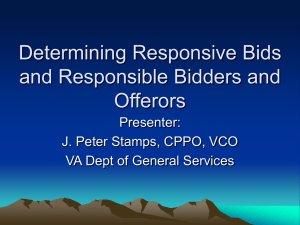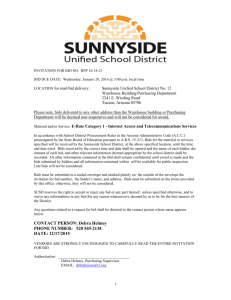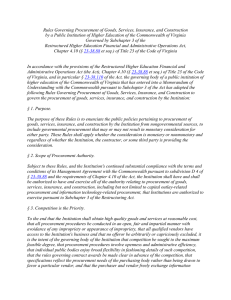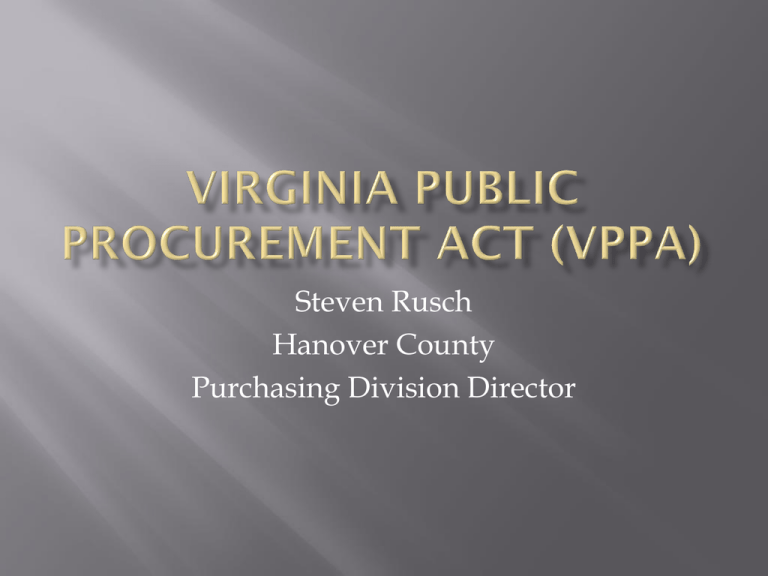
Steven Rusch
Hanover County
Purchasing Division Director
B. The purpose of this chapter is to enunciate the
public policies pertaining to governmental
procurement from nongovernmental sources,
to include governmental procurement that may
or may not result in monetary consideration for
either party. This chapter shall apply whether
the consideration is monetary or nonmonetary
and regardless of whether the public body, the
contractor, or some third party is providing the
consideration.
Competitive negotiation
1. Issuance of a written Request for Proposal.
2. Public notice at least 10 days prior to the date
set for receipt (posting to eVA meets this
requirement). Public bodies shall publish in a
newspaper of general circulation in the area in
which the contract is to be performed.
3. Professional services - work performed
within the scope of the practice of
accounting, actuarial services, architecture,
land surveying, landscape architecture,
law, dentistry, medicine, optometry,
pharmacy or professional engineering.
-
-
Engage in individual discussions with two or more
offerors deemed fully qualified, responsible and
suitable on the basis of initial responses and with
emphasis on professional competence.
Prohibited from using cost as an evaluation criteria
Negotiations conducted, beginning with the offeror
ranked first.
4. Nonprofessional services - any services not
specifically identified as professional
services in the definition of professional
services.
- Selection shall be made of two or more offerors
deemed to be fully qualified and best suited.
- Cost can be used as an evaluation criteria.
Competitive sealed bidding
1. Issuance of a written Invitation to Bid
2. Public notice at least 10 days prior to the date
set for receipt (posting to eVA meets this
requirement).
3. Public opening and announcement of all bids
received.
4. Evaluation of bids based upon the
requirements set forth in the invitation
5. Award to the lowest responsive and
responsible bidder.
Responsible bidder or offeror – “a person who has
the capability, in all respects, to perform fully the
contract requirements and the moral and business
integrity and reliability that will assure good faith
performance, and who has been prequalified, if
required.”
Responsive bidder - “a person who has submitted a
bid that conforms in all material respects to the
Invitation to Bid.”
B. Professional services shall be procured by
competitive negotiation.
C. Upon a determination made in advance by the
public body and set forth in writing that
competitive sealed bidding is either not
practicable or not fiscally advantageous to the
public, goods, services, or insurance may be
procured by competitive negotiation. The
writing shall document the basis for this
determination.
E. Upon a determination in writing that
there is only one source practicably
available for that which is to be
procured, a contract may be negotiated
and awarded to that source without
competitive sealed bidding or
competitive negotiation.
- Document basis for determination
- Public posting (eVA)
F. In case of emergency, a contract may be
awarded without competitive sealed
bidding or competitive negotiation;
however, such procurement shall be
made with such competition as is
practicable under the circumstances.
- Documentation includes: nature of emergency,
vendor selected & date on which award was or will
be made
- Public posting (eVA)
G. A public body may establish purchase
procedures, if adopted in writing, not requiring
competitive sealed bids or competitive
negotiation for single or term contracts for
goods and services other than professional
services if the aggregate or the sum of all
phases is not expected to exceed $100,000;
however, such small purchase procedures shall
provide for competition wherever practicable.
A. Any public body may participate in, sponsor,
conduct, or administer a cooperative
procurement agreement on behalf of or in
conjunction with one or more other public
bodies, or public agencies or institutions or
localities of the several states, of the United
States or its territories, the District of
Columbia, or the U.S. General Services
Administration, for the purpose of combining
requirements to increase efficiency or reduce
administrative expenses in any acquisition of
goods and services.
A. A public contract may include provisions for
modification of the contract during performance,
but no fixed-price contract may be increased by
more than twenty-five percent of the amount of
the contract or $50,000, whichever is greater,
without the advance written approval of the
Governor or his designee, in the case of state
agencies, or the governing body, in the case of
political subdivisions. In no event may the
amount of any contract, without adequate
consideration, be increased for any purpose,
including, but not limited to, relief of an offeror
from the consequences of an error in its bid or
offer.
B. Any public body may extend the term of an
existing contract for services to allow
completion of any work undertaken but not
completed during the original term of the
contract.”
C. Nothing in this section shall prevent any public
body from placing greater restrictions on
contract modifications.
A. In the solicitation or awarding of contracts, no
public body shall discriminate against a bidder
or offeror because of race, religion, color, sex,
national origin, age, disability, status as a
service disabled veteran, or any other basis
prohibited by state law relating to
discrimination in employment. Whenever
solicitations are made, each public body shall
include businesses selected from a list made
available by the Department of Minority
Business Enterprise.
B. All public bodies shall establish programs
consistent with this chapter to facilitate the
participation of small businesses and
businesses owned by women, minorities, and
service disabled veterans in procurement
transactions. The programs established shall be
in writing . . . or, where applicable, by the chief
executive of a local governing body pursuant to
§ 15.2-965.1, and shall include specific plans to
achieve any goals established therein.
§ 2.2-4311. Employment discrimination by
contractor prohibited
§ 2.2-4311.1. Compliance with federal, state, and
local laws and federal immigration law
§ 2.2-4311.2. Compliance with state law; foreign
and domestic businesses authorized to transact
business in the Commonwealth
§ 2.2-4312. Drug-free workplace to be
maintained by contractor
Unless otherwise provided in the Invitation to
Bid, the name of a certain brand, make or
manufacturer shall not restrict bidders to the
specific brand, make or manufacturer named and
shall be deemed to convey the general style, type,
character, and quality of the article desired. Any
article that the public body in its sole discretion
determines to be the equal of that specified,
considering quality, workmanship, economy of
operation, and suitability for the purpose
intended, shall be accepted.
Every public body awarding public contracts
shall establish procedures whereby comments
concerning specifications or other provisions in
Invitations to Bid or Requests for Proposal can be
received and considered prior to the time set for
receipt of bids or proposals or award of the
contract.
Unless canceled or rejected, a responsive bid from
the lowest responsible bidder shall be accepted as
submitted, except that if the bid from the lowest
responsible bidder exceeds available funds, the
public body may negotiate with the apparent low
bidder to obtain a contract price within available
funds. However, the negotiation may be
undertaken only under conditions and
procedures described in writing and approved by
the public body prior to issuance of the Invitation
to Bid and summarized therein.
A. An Invitation to Bid, a Request for Proposal,
any other solicitation, or any and all bids or
proposals, may be canceled or rejected. The
reasons for cancellation or rejection shall be
made part of the contract file. A public body
shall not cancel or reject an Invitation to Bid, a
Request for Proposal, any other solicitation, bid
or proposal pursuant to this section solely to
avoid awarding a contract to a particular
responsive and responsible bidder or offeror.
B. A public body may waive informalities in bids.
B. Except in case of emergency affecting the
public health, safety or welfare, no public
contract shall be awarded on the basis of cost
plus a percentage of cost.
A. Except as provided in this section, all proceedings,
records, contracts and other public records relating to
procurement transactions shall be open to the
inspection of any citizen, or any interested person, firm
or corporation, in accordance with the Virginia Freedom
of Information Act (§ 2.2-3700 et seq.).
C. Any competitive sealed bidding bidder, upon request,
shall be afforded the opportunity to inspect bid records
within a reasonable time after the opening of all bids
but prior to award, except in the event that the public
body decides not to accept any of the bids and to
reopen the contract. Otherwise, bid records shall be
open to public inspection only after award of the
contract.
D. Any competitive negotiation offeror, upon
request, shall be afforded the opportunity to
inspect proposal records within a reasonable
time after the evaluation and negotiations of
proposals are completed but prior to award,
except in the event that the public body
decides not to accept any of the proposals and
to reopen the contract. Otherwise, proposal
records shall be open to public inspection only
after award of the contract.
F. Trade secrets or proprietary information submitted
by a bidder, offeror or contractor in connection
with a procurement transaction or prequalification
application submitted pursuant to subsection B of §
2.2-4317 shall not be subject to the Virginia Freedom
of Information Act (§ 2.2-3700 et seq.); however, the
bidder, offeror or contractor shall (i) invoke the
protections of this section prior to or upon
submission of the data or other materials, (ii)
identify the data or other materials to be protected,
and (iii) state the reasons why protection is
necessary.
Every agency of local government that acquires
goods or services, or conducts any other type of
contractual business with a nongovernmental,
privately owned enterprise, shall promptly pay for
the completed delivered goods or services by the
required payment date. The required payment date
shall be either: (i) the date on which payment is due
under the terms of the contract for the provision of
the goods or services; or (ii) if a date is not established
by contract, not more than forty-five days after goods
or services are received or not more than forty-five
days after the invoice is rendered, whichever is later.
In those cases where payment is made by mail,
the date of postmark shall be deemed to be the
date payment is made for purposes of this
chapter.
Any contract awarded by any state agency, or any
contract awarded by any agency of local
government in accordance with § 2.2-4352, shall
include:
Specific wording provided for subcontractor
payments, collecting SSN/EIN information
from subcontractors, interest payments to
subcontractors for late payment
§ 2.2-4358. Appeal of denial of withdrawal of
bid
§ 2.2-4359. Determination of nonresponsibility
§ 2.2-4360. Protest of award or decision to award
§ 2.2-4361. Effect of appeal upon contract
§ 2.2-4363. Contractual disputes
2.2-4364. Legal actions
§ 2.2-4365. Administrative appeals procedure
§ 2.2-4366. Alternative dispute resolution
§ 2.2-4369. Proscribed participation by public
employees in procurement transactions
§ 2.2-4370. Disclosure of subsequent
employment
§ 2.2-4371. Prohibition on solicitation or
acceptance of gifts; gifts by bidders, offerors,
contractor or subcontractors prohibited
§ 2.2-4372. Kickbacks
§ 2.2-4373. Participation in bid preparation;
limitation on submitting bid for same
procurement
§ 2.2-4374. Purchase of building materials, etc.,
from architect or engineer prohibited
§ 2.2-4375. Certification of compliance required;
penalty for false statements
§ 2.2-4376. Misrepresentations prohibited
§ 2.2-4376.1. Contributions and gifts;
prohibition during procurement process
§ 2.2-4377. Penalty for violation. -- Any person
convicted of a willful violation of any provision
of this article shall be guilty of a Class 1
misdemeanor. Upon conviction, any public
employee, in addition to any other fine or
penalty provided by law, shall forfeit his
employment.
Questions?

